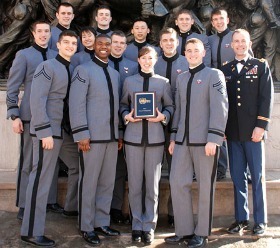A few words in defense of West Point: They sure do Model United Nations well

I've
bashed West Point and the rest of the professional military educational
establishment quite a bit in this blog, so I welcomed this chance to let a CNAS
colleague say a few nice words about the USMA.
By
Peter Bacon
Best
Defense guest columnist
Last
week the program Parks and Recreation showcased one
of the nerdiest extracurricular activities of all: Model United Nations.
This activity, known for its geeky high school and college students and its
focus on international affairs, offers some surprising insights into the state
of civil-military relations and international affairs education in this
country. I know -- I spent three years in college competing as a delegate.
At the college level, some of the best teams for Model UN
are from our military academies. West Point's team is consistently rated as one
of the best programs in the country; the other service academies that field
teams, the Air Force and Naval Academies, always put up solid teams and
delegates. In part, these delegates excel because they are instructed in
leadership in the classroom and on the parade field. Nice uniforms, including
the renowned cadet gray, also help make a good first impression. But most of
all, these delegates excel because they know just that much more about the military-aspect of international affairs
than the average college student. Civilian delegates understand the bare
minimum of military culture and tactics: civilians will illustrate their basic
grasp by making arguments in committee amounting to "bomb this, not that" or
"move X troops here." Service academy delegates, meanwhile, will explain
complex military and diplomatic operations to committees ranging from 30 to
300. Routinely, this means that civilian students fail to question any
military-related policies of West Point or Naval Academy delegates. As a
testament to this, most committees will give a military delegate a portfolio
related to the military, such as Secretary of Defense or a military commander.
It's not hard to see why this happens: civilian students
simply do not learn anything about
this facet of our society. Foreign policy classes focus more on flighty theory
than actual practice. History classes barely focus on hard
military or diplomatic history. When I led delegates as an undergraduate,
one of the things that I struggled with was teaching freshmen straight out of
high school about general military capabilities simply because they knew so little about the topic.
The service academies, specifically West Point, are trying
to correct this educational imbalance: West Point's Model UN team set up its own
conference, dedicated primarily to educating civilians about the military.
I had the privilege of attending the conference in April: the Cadets made a
great effort to create realistic committees and instruct civilian students
about the military. From panels and speakers to eating alongside cadets and
learning about military culture and doctrine, the conference was, by the
accounts of my teammates, both "fantastic" and "eye-opening."
West Point has hopefully set a precedent that will follow:
directly engaging civilians, in an era when few ever interact at length with
members of our military, may be the only way to get them educated about
military affairs.
Thomas E. Ricks's Blog
- Thomas E. Ricks's profile
- 436 followers



